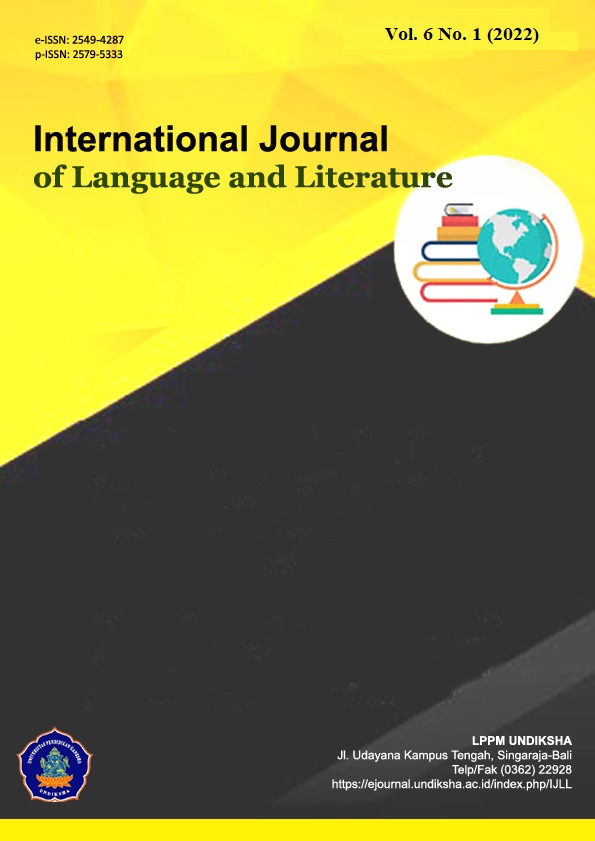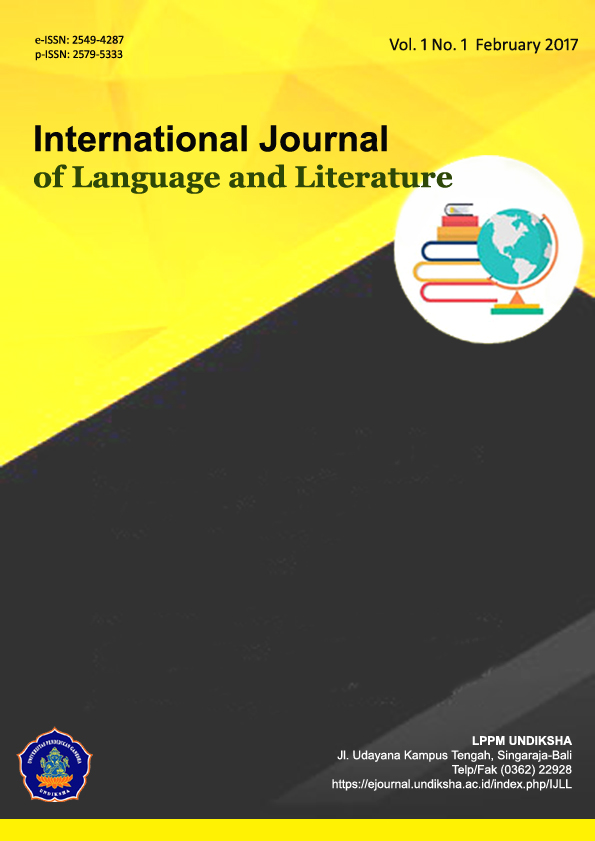Politeness Strategies Used in the First Trump-Clinton Presidential Debate
DOI:
https://doi.org/10.23887/ijll.v6i1.46491Keywords:
Politeness strategyAbstract
The way speaker appreciating and maintaining the condition to the recipient in the communication is called politeness. Being polite is complicated but sometimes interesting thing in any language. This study focused on analyses the types of politeness strategy expressed by the speakers and analyze what factors were influenced the chosen of politeness strategy implemented by the speakers. However the population in this study is all people in who come in this presidential debate and the sample are Hillary Clinton, Donald Trump, and the moderator. The data collection method used was documentation method which applied to get the data. The instrument used was the researcher by hearing, observing, and taking a note during the presidential debate. Then, the data analysis method was descriptive qualitative method by analyzing the transcript of debate. It can be concluded that there were four types of politeness strategy found: bald-on-record strategy, positive politeness strategy, negative politeness strategy, and off-record strategy. The result of study found that there were two factors applied in the debate, which are payoff factors and sociological factors. The implication of this study was politeness strategy by Brown and Levinson was known by readers and also this politeness strategy used could be used in our communication, especially for the people who join the election.
References
Abudayeh, H., & Dubbati, B. (2020). Politeness strategies in translating Donald Trump’s offensive language into Arabic. Perspectives: Studies in Translation Theory and Practice, 28(3), 424–439. https://doi.org/10.1080/0907676X.2019.1709514. DOI: https://doi.org/10.1080/0907676X.2019.1709514
Adel, S. M. R., Davoudi, M., & Ramezanzadeh, A. (2016). A qualitative study of politeness strategies used by Iranian EFL learners in a class blog. Iranian Journal of Language Teaching Research, 4(1), 47–62. https://doi.org/10.30466/IJLTR.2016.20377.
Al-Bantany, N. F. (2013). The Use of Commissive Speech Acts and Its Politeness Implication: A Case of Banten Gubernatorial Candidate Debate. Passage, 1(Vol 1, No 2 (2013): October Graduation 2013), 21–34. https://ejournal.upi.edu/index.php/psg/article/view/534.
Amran, A., Perkasa, M., Jasin, I., Satriawan, M., & Irwansyah, M. (2019). Model Pembelajaran Berbasis Nilai Pendidikan Karakter Untuk Generasi Indonesia Abad 21. Lentera Pendidikan : Jurnal Ilmu Tarbiyah Dan Keguruan, 22(2). https://doi.org/10.24252/lp.2019v22n2i5. DOI: https://doi.org/10.24252/lp.2019v22n2i5
Ayuningrum, A., Pulungan, R., & S, S. (2019). an Analysis of Politeness Strategies Applied By the Members of Ukm Debat,the University of Bengkulu. Journal of English Education and Teaching, 2(4), 1–8. https://doi.org/10.33369/jeet.2.4.1-8. DOI: https://doi.org/10.33369/jeet.2.4.1-8
Azwan, A. (2018). Politeness strategies of refusals to requests by Ambonese community. LINGUA: Jurnal Bahasa, Sastra, Dan Pengajarannya, 15(1), 1–6. https://doi.org/10.30957/lingua.v15i1.440. DOI: https://doi.org/10.30957/lingua.v15i1.418
Bates, A. (2019). Character education and the ‘priority of recognition’’.’ Cambridge Journal of Education, 49(6), 695–710. https://doi.org/10.1080/0305764X.2019.1590529. DOI: https://doi.org/10.1080/0305764X.2019.1590529
Brown, P., & Levinson, S. C. (1987). Politeness Some universals in language usage Studies in Interactional Sociolinguistics 4. Cambridge University Press. DOI: https://doi.org/10.1017/CBO9780511813085
Collins, L., & Jisum, C. (2019). The role of linguistics studies on the political debate. Linguistics and Culture Review, 3(July), 48–59. https://doi.org/10.37028/lingcure.v3n1.15. DOI: https://doi.org/10.21744/lingcure.v3n1.15
Fracchiolla, B. (2011). Politeness as a strategy of attack in a gendered political debate-The Royal-Sarkozy debate. Journal of Pragmatics, 43(10), 2480–2488. https://doi.org/10.1016/j.pragma.2011.02.006. DOI: https://doi.org/10.1016/j.pragma.2011.02.006
Garg, R., & Sengupta, S. (2020). Conversational Technologies for In-home Learning: Using Co-Design to Understand Children’s and Parents’ Perspectives. Conference on Human Factors in Computing Systems-Proceedings, 1–13. https://doi.org/10.1145/3313831.3376631. DOI: https://doi.org/10.1145/3313831.3376631
Ma’yuuf, H. H., & Hasan, T. A.-R. (2021). A Semantic-Pragmatic Study of Understatement in Trump’s and Biden’s 2020 Presidential Debate. PalArch’s Journal of Archaeology of Egypt / Egyptology, 18(4), 2610–2619. https://archives.palarch.nl/index.php/jae/article/view/6689.
Maharani, T. (2018). A Study of Politeness Strategies Used by Hillary Clinton and Donald Trump On The Second Presidential Debate.
Mahmud, M. (2019). The use of politeness strategies in the classroom context by English university students. Indonesian Journal of Applied Linguistics, 8(3), 597–606. https://doi.org/10.17509/ijal.v8i3.15258. DOI: https://doi.org/10.17509/ijal.v8i3.15258
Manik, S., & Hutagaol, J. (2015). An Analysis on Teachers’ Politeness Strategy and Student’s Compliance in Teaching Learning Process at SD Negeri 024184 Binjai Timur Binjai –North Sumatra-Indonesia. English Language Teaching, 8(8), 152–170. DOI: https://doi.org/10.5539/elt.v8n8p152
Mohammad, S., Adel, R., Davoudi, M., & Ramezanzadeh, A. (2016). A qualitative study of politeness strategies used by Iranian EFL learners in a class blog Iranian Journal of Language Teaching Research. Iranian Journal of Language Teaching Research, 4(1), 47–62. https://doi.org/10.30466/IJLTR.2016.20377.
Ouafeu, Y. T. S. (2006). Politeness strategies in colloquial Cameroon English: Focus on three pragmatic particles: na, ya and eihn. Nordic Journal of African Studies, 15(4), 536–544. https://doi.org/10.53228/njas.v15i4.42 Published 2006-12-31.
Pakzadian, M. (2012). Politeness principle in 2008 presidential debates between Mc Cain and Obama. Mediterranean Journal of Social Sciences, 3(3), 351–357. https://doi.org/10.5901/mjss.2012.v3n3p351.
Pariera, K. (2006). The Use of Politeness Strategies in Email Discussions About Taboo Topics. McNair Scholars Online Journal, 2(1), 320–341. https://doi.org/10.15760/mcnair.2006.320. DOI: https://doi.org/10.15760/mcnair.2006.320
Paternoster, A., & Fitzmaurice, S. (2019). Politeness in Nineteenth-Century Europe. John Benjamins Publishing Company. DOI: https://doi.org/10.1075/pbns.299
Pike, M. A., Hart, P., Paul, S. A. S., Lickona, T., & Clarke, P. (2020). Character Development through The Curriculum: Teaching and Assessing The Understanding and Practice of Virtue. Journal of Curriculum Studies, 1–18. https://doi.org/10.1080/00220272.2020.1755996. DOI: https://doi.org/10.1080/00220272.2020.1755996
Prasetyo, B., Rustono, R., & Pristiwati, R. (2020). The Use of Politeness Strategies in the Indonesia’s 2019 Presidential Campaign Teams on Online News Media. EAI, 1. https://doi.org/10.4108/eai.29-6-2019.2290357. DOI: https://doi.org/10.4108/eai.29-6-2019.2290357
Ryabova, M. (2015). Politeness strategy in everyday communication. Procedia-Social and Behavioral Sciences, 206, 90–95. https://doi.org/10.1016/j.sbspro.2015.10.033. DOI: https://doi.org/10.1016/j.sbspro.2015.10.033
Sibarani, J. G., & Marlina, L. (2018). Politeness Strategy used in Republican Debate by Donald trump. E-Journal of English Language & Literatyre, 7(4), 531–535. https://doi.org/10.24036/ell.v7i4.102007.
Sihite, M. R., Lubis, S. I., & Silalahi, D. M. A. (2021). Politeness Strategies Used By The Presidential Candidates Of Indonesia In The 2019 Presidential. Journal of English and English Education, 1(2), 9–17. http://siakad.univamedan.ac.id/ojs/index.php/excellence/article/view/268. DOI: https://doi.org/10.47662/ejeee.v1i2.268
Sodikin. (2014). Politeness Strategy in Indonesian Translation: Has It Already Changed? Prosiding Prasasti, 39(1), 1–15. https://doi.org/10.20961/pras.v0i0.1536.
Spencer-Oatey, H., & Kádár, D. Z. (2015). The Bases of (Im)politeness Evaluations: Culture, the moral order and the East-West divide. East Asian Pragmatics, 1(1). https://doi.org/10.1558/eap.v1i1.27762. DOI: https://doi.org/10.1558/eap.v1i1.27762
Togatorop, F. (2019). Politeness Strategies Used in the Conversation between the Students of Finance and Banking Department in Murni Sadar Polytehnic Pematangsiantar. Journal of English Teaching as a Foreign Language, 5(1), 37–48. http://ejournal.uhn.ac.id/index.php/jetafl/article/view/115.
Wahyuningsih, W., & Nirmala, D. (2020). Perlocutionary Act of Euphemism in Indonesian Presidential Election Debate 2019. Indonesian Journal of EFL and Linguistics, 5(1), 113. https://doi.org/10.21462/ijefl.v5i1.230. DOI: https://doi.org/10.21462/ijefl.v5i1.230
Widodo, B., & Al Muchtar, S. (2020). The Optimization of Civic Education in Building the Harmony of Religious Life Through Religious Humanism Approach. 418(Acec 2019), 57–61. https://doi.org/10.2991/assehr.k.200320.011. DOI: https://doi.org/10.2991/assehr.k.200320.011
Zhang, Y., Yuan, Y., Su, J., & Xiao, Y. (2021). The effect of employees’ politeness strategy and customer membership on customers’ perception of co-recovery and online post-recovery satisfaction. Journal of Retailing and Consumer Services, 63, 102740. https://doi.org/10.1016/j.jretconser.2021.102740. DOI: https://doi.org/10.1016/j.jretconser.2021.102740
Downloads
Published
How to Cite
Issue
Section
License
Copyright (c) 2022 International Journal of Language and Literature

This work is licensed under a Creative Commons Attribution-ShareAlike 4.0 International License.
IJLL Journal provides immediate open access to its content on the principle that making research freely available to the public to supports a greater global exchange of knowledge.

This work is licensed under a Creative Commons Attribution-ShareAlike 4.0 International License








